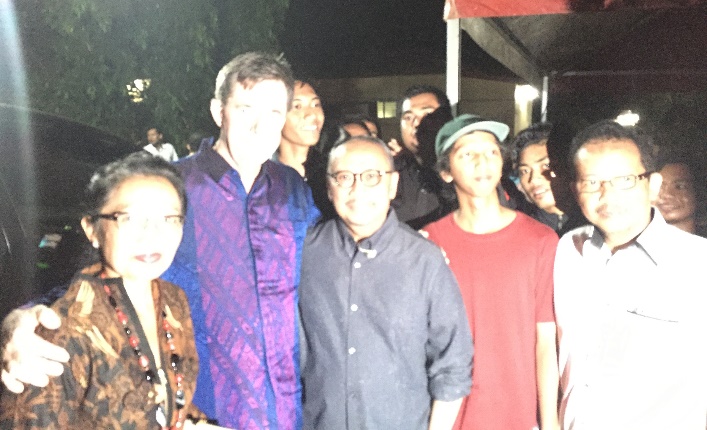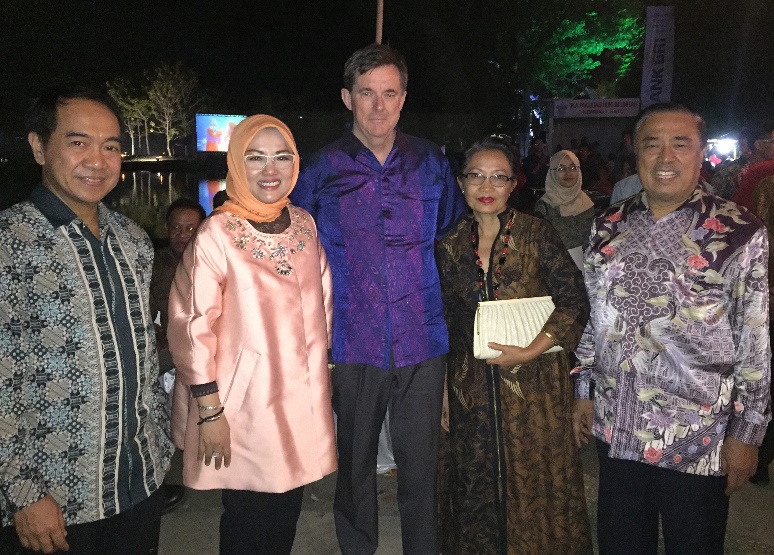This month Makassar’s leading university, Universitas Hasanuddin, celebrated its sixtieth anniversary. Opened by the Indonesian Republic’s first Vice President Drs Mohammad Hatta as a full university on 10 September 1956, it is one of the oldest universities in Indonesia. One of its first faculties was medicine, followed by engineering, then arts and letters. It now has a broad range of faculties catering to the needs of communities across eastern Indonesia. Among its famous graduates are the current Vice President, the current Governor of South Sulawesi, numerous ministers and senior lawmakers, and major business figures in eastern Indonesia.
We attended the national alumni gathering at Hasanuddin University (known as Unhas) on Saturday evening at a function set around a lovely little lake on the campus near the science and technology faculty.
Unhas is renowned for its green campus: one of the delights of calling on, Prof Dr Dwia Aries Tina Pulubuhu MA, the current Rector and first women to lead the university, is to enjoy the fantastic view from her 8th floor office over the campus, looking east to the mountains of South Sulawesi. This is a rare sight in crowded, growing Makassar, so I never miss the opportunity of joining visiting Australian university leaders on a visit to Unhas.
Prof Dwia welcomed Putri and I to the evening gathering, which included a display of the talents of students and staff. Two comedians (uni students) MC-ed the show, which included jazz and traditional Indonesian music performed by lecturers and former students, and a performance by the Unhas student choir. This choir, which has performed in numerous international events, presented a mix of local folk songs with a modern touch. Perfect pitch, lovely to watch, it took me back to my university days as a chorister (but I still cannot sing…).
The evening wore on and we chatted with Governor Syahrul Yassin Limpo, an Unhas law graduate; Pak Alwi Hamu, owner of the Fajar group and an Unhas graduate; and Prof Jamaluddin Jompa, Dean of Unhas’ Faculty of Marine Science and Fisheries, and also an Australian alumni. Other senior Indonesian graduates were from the central government in Jakarta, including Pak Abdul Wahab Secretary-General of the Ministry of Manpower and Pak Guntur from the Constitutional Court. If it looks like I am name-dropping here, it is only to show how influential and important Unhas graduates are in Indonesian national life!
|
|
Prof Jamaluddin Jompa, Prof Diwa Palubuhu, Pak KonJen, Ibu KonJen, Pak Alwi Hamu (l-r) |
Prof Dwia was also very proud of the fact that on Indonesia’s recent Independence Day celebrations, Unhas was recognised by the Minister for Research, Technology and Higher Education as rising three rankings up the list of the top 12 universities in Indonesia. It is now ranked 8th behind the likes of Universitas Indonesia and Gajah Mada University for the quality of its teaching, research, facilities, student achievements and accreditation standards.
The evening was fun but we began to tire so took our leave of Prof Dwia and company. But then something magical happened.
As Putri and I were getting into our car I heard a very familiar voice begin singing from the distant stage. I asked Pak Andi Amri, Unhas’ Director of International Relations who had escorted us to the car, if that was the voice of Ebiet? Indonesia’s famous singer-songwriter whose music had influenced a generation of young people in the 1970s through to the 1990s?
Yes, Pak Amri said, we invited him to our 60th anniversary.
I got back out of the car. This was not to be missed. I walked towards the stage and stood transfixed as Ebiet G Ade, now aged 61, sang strumming his guitar, in the same clear and tender tones I recalled from the 1980s when I often listened to his music on cassette. I still have his first ever album – Camellia 1 released in 1979. His music was important to me, and to many young people at the time: his poetry was about love, and the suffering of the poor and those forgotten by society. During the Soeharto era his music was the soft side of protest music – Iwan Fals sang from the hard side.
I also found Ebiet’s poetry accessible, as a learner of Bahasa Indonesia. His language wasn’t too complicated, and I enjoyed the imagery he conjured up in his songs.
As Ebiet sang I heard older members of the audience – the lecturers and others closer to our current age – sing along to some of those lilting melodies from the 1980s. Putri and I sat and listened as he announced his last song of the evening. He said this was for the young people in the audience, it held meaning that many would relate to. It is a great song: Berita Kepada Kawan, news for a friend, about a disaster that happened in central Java in the 1970s. But it is a song that captures the hopelessness of many, of the poor and those who struggle to survive, farmers, herders, simple villagers.
Berita Kepada Kawan
|
Perjalanan ini Trasa sangat menyedihkan Sayang engkau tak duduk Disampingku kawan
|
This journey Saddens me Pity you cannot sit beside me friend |
|
Banyak cerita Yang mestinya kau saksikan Di tanah kering bebatuan
|
Many stories You should witness In this dry stony land |
|
Tubuhku terguncang Dihempas batu jalanan Hati tergetar menatap kering rerumputan |
My body is shaken Rocked by the broken road My heart shivers as I look At the dry grassland |
|
Perjalanan ini pun Seperti jadi saksi Gembala kecil Menangis sedih ...
|
Even this journey Is a witness to a little goatherd Crying heartbroken |
|
Kawan coba dengar apa jawabnya Ketika di kutanya mengapa Bapak ibunya tlah lama mati Ditelan bencana tanah ini
|
Friend just listen to what he said When I asked him why His mother and father had long died Swallowed by this land’s disaster |
|
Sesampainya di laut Kukabarkan semuanya Kepada karang kepada ombak Kepada matahari
|
Reaching the sea I told it all To the coral, to the waves To the sun |
|
Tetapi semua diam Tetapi semua bisu Tinggal aku sendiri Terpaku menatap langit
|
But all were quiet But all were dumb Just I remained alone Transfixed looking at the sky |
|
Barangkali di sana ada jawabnya Mengapa di tanahku terjadi bencana
|
Perhaps there Is the answer Why disaster has hit my land |
|
Mungkin Tuhan mulai bosan Melihat tingkah kita Yang selalu salah dan bangga dengan dosa-dosa
|
Maybe God has become bored Watching our conduct Always so proud of our sins |
|
Atau alam mulai enggan Bersahabat dengan kita Coba kita bertanya pada Rumput yang bergoyang |
Or nature is no longer willing to befriend us Let’s ask the swaying grasses. |
The music is sweet, gentle, like a lullaby, and Ebiet’s voice diamond clear. Yet it is a sad song: no-one listens to the sadness, maybe not even God or nature. Only perhaps, the swaying grasses.
We left to return to our car. But then more magic happened. As we were about to leave a group of people headed up the car park. It was Ebiet surrounded by his crew and a crowd of journalists. I got out again. Nervously I approached him. People around stopped and watched as I shook his hand and told him how much I loved his music, how I had listened to his albums as a young man. He said, graciously, “you are still young”, and agreed to a photo – here attached although it is a little over-exposed. The media scrum took lots of photos and perhaps they have a better one to share.

That was it. Another special moment in Makassar.
***

